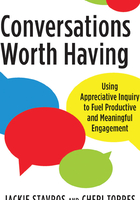
The Inquiry-Based and Statement-Based Dimension
In the second dimension, conversations are either inquiry-based or statement-based: We are either asking questions or making comments. Inquiry-based remarks are questions that aim to generate information; reveal hidden assumptions, perspectives, or knowledge; expand awareness; make room for the emergence of possibility or opportunity; deepen understanding; or initiate change. Questions that arise out of curiosity and genuine interest build relationships, connections, and awareness. Such questions add value and are appreciative in nature. Recall a conversation in which someone’s questions resulted in your feeling more connected to them or even more inspired to take action. What kinds of questions were asked?
On the other hand, questions can arise from a place of judgment or criticism. Such questions are often rhetorical or pejorative, devaluing people. They are depreciative in nature. Think back to a time when you or someone else asked questions that left you feeling disempowered or critiqued. What kinds of questions were asked in that situation?
Then there are statement-based interactions, made up of declarative statements. These comments can add value (affirmative statements) or can devalue (destructive statements). When statements are appreciative, people are saying positive things, responding to questions, and advocating in ways that contribute or point to important facts. Such conversations are valuable and have positive impact on people and situations. Statements that are depreciative in nature often show up as criticism, blame, and general negativity. The seeds of division are sown, leaving little to no room for learning and growth.
Combining these two dimensions—appreciative versus depreciative and inquiry-based versus statement-based—gives us a way to understand the nature of our conversations and their impact. It suggests there are four basic types of conversations or interactions:
1.Conversations that add value through appreciative questions and dialogue: We call these Conversations Worth Having.
2.Conversations that add value through appreciative comments and statements: We call these Affirmative Conversations. These are also worth having, to a point.
3.Conversations that devalue through depreciative questions and defensive interactions: We call these Critical Conversations. These conversations may be worth having, also to a point.
4.Conversations that devalue through depreciative comments and statements: We call these Destructive Conversations. These are not worth having.
At the heart of every conversation there is tone and direction: How is the conversation making us feel, and where is the conversation taking us? Many of us find ourselves stuck in conversations that are depreciative in nature. These drag us down and zap energy. Intentionally shifting our conversations to be appreciative and inquiry-based can transform our relationships and workplace outcomes. Think about conversations you’ve had with family members, friends, colleagues, or your boss. How did you feel after a conversation that you thought was worthwhile? After a critical conversation? A destructive conversation? Or, simply, an affirmative conversation? Which of those conversations had the greatest impact on your sense of well-being or helped you, your colleagues, or your team move forward?
When Kamal asked Elizabeth and Ram to come to his office at the bank to talk about their performance, he could have used several conversational options. The problem was taking too much time to open accounts and not opening enough new accounts. The tone and direction of the conversation would have been depreciative had he said, “We have a problem. Why is it taking you so long to open accounts? Why do you open so few accounts?” Instead, he stated the problem and reframed it by asking a generative question, inviting his staffers to pool their expertise and co-create a new process for opening accounts at the bank:
Elizabeth, you open the most accounts every month. Ram, you are faster than anyone else at opening accounts. Would you two be willing to work together to combine your areas of expertise to have the fastest, most efficient account opening process for the bank?
This created an appreciative tone that was inquiry-based, with positive direction. Such an approach contributed to Elizabeth’s and Ram’s motivation to succeed. Their conversation was productive because of that. The result helped them both to improve their productivity, while it also supported excellence for all account managers. Tone and direction influence our health, happiness, relationships, actions, and success in life. Our conversations are worthy of our care and attention. Let’s take a closer look at each of these four kinds of conversations and how they show up in our lives.
Our conversations are worthy of our care and attention. Let’s take a closer look at each of these four kinds of conversations and how they show up in our lives.